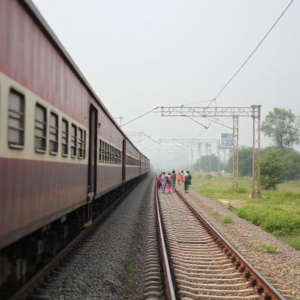Indian Railways plays a crucial role in managing migration in India. Migration refers to the movement of people from one place to another, usually in search of better opportunities like jobs, education, or a better standard of living. People may migrate from rural areas to urban cities or from one state to another for various reasons. Indian Railways helps manage this migration in several ways, making it easier and more affordable for people to move from one place to another.

1. What is Migration?
Migration is the movement of people from one location to another. In India, migration happens for different reasons:
- Employment: People often migrate to cities or industrial hubs in search of better job opportunities.
- Education: Students migrate to different cities or towns to pursue higher education.
- Social Reasons: People may also migrate for marriage, healthcare, or family-related reasons.
- Seasonal Migration: Many people move temporarily, especially in agriculture-based regions where they seek work during harvest seasons or for construction work in cities.
2. How Indian Railways Helps Manage Migration
Indian Railways plays a vital role in facilitating the movement of millions of people across India every year. Here’s how:
a) Affordable and Accessible Transport
- Cost-Effective Travel: Indian Railways is one of the most affordable modes of transport in the country. For many migrants, especially those from rural areas, trains offer the cheapest and most accessible way to travel long distances to cities or towns.
- Various Train Services: Indian Railways provides a variety of train services catering to different needs. From budget-friendly passenger trains to more comfortable superfast trains, there are options for all kinds of travelers.
b) Connecting Remote Areas to Cities
- Wide Network: Indian Railways operates one of the largest rail networks in the world. With over 67,000 kilometers of tracks, it connects almost every corner of the country, including remote villages and urban centers. This makes it easier for people in far-off areas to migrate to cities.
- Daily and Special Trains: Indian Railways runs special trains during peak migration periods, such as during festivals or harvest seasons, to accommodate the extra demand for travel. There are also daily trains that migrants can rely on to travel regularly for work or other reasons.
c) Migration During Festivals
- Festival Travel: During major festivals like Diwali, Eid, and Chhath Puja, many people travel back to their hometowns or visit relatives. Indian Railways manages this huge seasonal migration by increasing the number of trains and ensuring that they run efficiently during these peak times.
- Special Trains: Indian Railways runs special trains during festivals to manage the large number of people traveling. These special trains are added to the regular schedule to provide more capacity and reduce overcrowding.
d) Ease of Booking and Travel
- Online Ticketing: With the growth of digital technology, Indian Railways now offers online booking services through the IRCTC website and mobile app. This makes it easier for migrants to plan their travel and book tickets in advance, without the hassle of waiting in long queues at stations.
- Tatkal Scheme: For urgent travel, Indian Railways offers the Tatkal booking system, allowing people to book tickets at the last minute. This is useful for migrants who may need to travel urgently for personal or work-related reasons.
e) Transporting Migrant Workers
- Migrant Workers in Construction and Agriculture: Many migrants, especially from rural areas, travel to cities for construction or agriculture work. Indian Railways ensures that these workers can travel affordably and safely. Trains transport a large number of people, including workers, from villages to cities where construction projects, factories, and other industries are located.
- Special Trains for Workers: During certain times of the year, Indian Railways organizes special trains for migrant workers. These trains are specifically designed to accommodate large groups of people, ensuring their comfort and safety.
3. Impact of Indian Railways on Migrants
Indian Railways has a significant impact on migrants in India:
- Economic Opportunities: By making it easier to travel between rural and urban areas, railways help people access job opportunities in cities, which boosts their income and standard of living.
- Social Connections: Railways help maintain social connections by allowing people to travel to meet family members, visit hometowns, and participate in festivals.
- Regional Development: The accessibility provided by railways helps in regional development, as people from underdeveloped regions can travel to cities for better opportunities, which can improve their quality of life.
- Safe and Reliable: Rail travel is considered safer than other forms of long-distance travel like buses, especially for large groups of people. Indian Railways ensures that even during peak travel periods, the safety and comfort of passengers are prioritized.
4. Challenges Indian Railways Faces in Managing Migration
While Indian Railways plays a crucial role in managing migration, it also faces several challenges:
- Overcrowding: During peak migration periods, like festivals, the demand for train tickets often exceeds the supply, leading to overcrowded trains and stations.
- Delays and Cancellations: With the large number of trains and passengers, delays and cancellations sometimes occur, affecting migrants who rely on timely transportation.
- Infrastructure Constraints: Some parts of the railway network are outdated or overburdened, which can affect the efficiency and comfort of travel, especially for migrants traveling long distances.
5. Future Improvements for Migrants
To further improve the experience of migrants, Indian Railways is working on:
- Upgrading Infrastructure: Modernizing stations and improving tracks to reduce delays and increase efficiency.
- More Special Trains: Running more special trains during peak migration periods to accommodate the high demand.
- Improved Amenities: Enhancing the facilities and amenities on trains and at stations to make the travel experience more comfortable for migrants.
- Better Safety Measures: Ensuring the safety of all passengers, including women and children, especially during busy travel periods.
Summary
In simple terms, Indian Railways plays an essential role in managing migration across India by providing:
- Affordable travel options for millions of people moving from rural areas to cities or other regions.
- Special trains during festivals or peak migration times to handle the extra travel demand.
- Online booking and easy access to train tickets, making travel convenient for migrants.
- A safe and reliable mode of transport that helps people access jobs, education, and family connections.
Indian Railways helps migrants in their journey by offering an affordable and efficient way to move across the country, thereby supporting their economic growth and social well-being. Even though there are challenges like overcrowding, Indian Railways continues to improve its services to better manage migration in the future.
Keywords: Indian Railway, Railway
Tags:
21st Century Innovations,
Accident Investigation,
advanced communication systems.,
Advanced Signaling for High-Speed Rail,
Advanced Track Switching,
Advanced Train Control,
Advanced Weather Monitoring,
Advancements in Signaling,
Age of Automation,
Annual Budget Forecasting,
Anti-Accident Technologies,
Artificial Intelligence,
Automated Ticketing,
Automatic Train Identification (ATI),
Automatic Train Operation (ATO),
Behavioral Analytics,
Big Data Analytics,
Big Data in Railway Management,
Border Security,
Border Security and Control,
Budget and Funding,
carbon footprint reduction,
Cargo and Containerization,
Challenges and Opportunities,
Challenges Faced,
Challenges in Freight Management,
Challenges in Hilly Areas,
Challenges of Electric and Diesel Engines Integration,
Civil Services Examinations,
Cleanliness Initiatives,
Coal Transport,
Collaboration with Startups,
collision avoidance,
Collision Prevention Technology,
Comfort Systems,
Commercial Development,
Communication Protocols,
community engagement,
Connected Logistics Hubs,
Construction and Engineering,
Construction of Railway Bridges,
continuous improvement,
Corporate Social Responsibility (CSR),
crisis management,
Cross-Border Communication,
Crowd Management,
Customer Service Innovations,
Cybersecurity,
data analytics,
Data Communication Systems,
Data encryption,
data privacy,
Dedicated Freight Corridors (DFC),
Dedicated Passenger Corridors,
Design and Architecture of Stations,
Development of Railway Coaches,
Digital Communication,
Digital Infrastructure Development,
digital innovation,
Digitization of Operations,
Disaster Management Communication,
Division Structure,
Eco-Friendly Rail Projects,
Eco-Tourism,
Economic Growth Role,
economy,
Education,
Education and Research Centers,
Education and Skill Development,
Electric Train Propulsion,
Electrification Systems,
Electronic Gate Systems,
Electronic Signaling,
Elevated Rail Corridors,
Emergency Alert Systems,
emergency response,
Emergency Response Systems,
emergency services,
Emergency Systems,
Energy Efficiency,
Environment Conservation,
Environmental Conservation,
Environmental Protection,
environmental regulations,
Export of Railway Equipment,
facial recognition,
fiber optic communication,
Financial Strategies,
food security,
Freight and Logistics Solutions,
Freight Services,
Freight Services for Agriculture,
Freight Tracking Systems,
funding,
Future of Indian Railways,
Future of Mobility,
future technologies.,
gender equality,
Geographical Distribution of Railway Zones,
Global Recognition,
Government Policies,
GPS Train Tracking,
Green Initiatives,
Healthcare,
Heavy Goods Transport,
Historical Milestones,
History and Evolution,
Housing Development Projects,
Impact of Train Accidents,
Impact on Agriculture,
Impact on Indian Politics,
Impact on Industrial Growth,
Indian Railway,
Indian Railway Policies,
Indian Railway Services,
Indian Railways Global Context,
Indian Railways Services,
Industrial Clusters,
Infrastructure,
Infrastructure Challenges,
infrastructure development,
Infrastructure Financing,
Initiatives,
innovation,
Innovation and Research,
Innovation in Train Scheduling,
Innovations in Communication,
Innovations in Passenger Security,
Integrated Traffic Control,
Integration with Other Transport Modes,
intelligent transportation systems,
International Collaboration,
International Comparisons,
International Exhibitions,
International Projects,
international trade,
IoT integration,
IRAS,
IRPS,
IRSE,
IRSS,
IRTS,
Job Creation Programs,
job opportunities,
Job Profiles,
Land Acquisition Challenges,
Land Leasing,
Logistics Partnerships,
Long-Distance Travel Challenges,
Long-Term Vision,
Low-Cost Rail Travel Initiatives,
Maintenance Centers,
Maintenance of Stations,
Maintenance Practices,
Managing Migration,
minerals,
Mobile Communication Networks,
Modernization of Coaches,
Modernization Projects,
Museums,
National Defense,
National Railways Development Corporation (NRDC),
national security,
Natural Disasters,
Network Interference,
network optimization,
New Lines in Remote Areas,
New Projects,
Noise and Vibration Reduction,
Noise Monitoring,
oil,
Onboard Data Logging,
operations,
Organization and Structure,
Parcel Services,
Passenger and Freight Services,
Passenger Complaint Management,
Passenger Feedback,
Passenger Safety,
Passenger Security,
Personnel Training,
Pilgrimage Trains,
Private Investments,
Private Sector Participation,
Projects and Funding,
Public Awareness Programs,
public engagement,
Public Health Programs,
Public Safety at Stations,
public transport,
public-private partnerships,
Punctuality,
Rail Budget vs General Budget,
Rail Safety Education,
Railway and Aviation Integration,
Railway Communication Networks (GSM-R),
Railway Electrification,
Railway Engineering,
Railway Line Expansion,
Railway Recruitment,
Railway Recruitment Board Exams,
Railway Simulation Systems,
Railway Theories,
Railway Ticketing Fraud Prevention,
Railway Tourism,
Railway-Based E-Commerce,
Railway's Impact on Urbanization,
Railways and Supply Chain Management,
Real-Time Location Monitoring,
Recruitment,
Regional Development,
Regional Economic Impact,
remote control systems,
research and development,
RFID Implementation,
Road Safety Integration,
Robust Communication in Remote Areas,
Role During Festivals,
Role During Natural Disasters,
Role in Export Economy,
Role in National Integration,
Role in Urbanization,
Role of 5G,
Role of Railway Zones,
rural connectivity,
rural development,
Safety and Accident Prevention Systems,
Safety and Security Policy Initiatives,
Safety Engineering,
Safety Features,
Safety Initiatives,
Safety Protocols,
safety systems,
Safety Technologies,
Satellite communication,
Satellite-Based Positioning,
Security,
Semi-High-Speed Rail,
Signal and Switch Automation,
signal synchronization,
Signaling Systems,
Signals and Communication Systems,
Smart Coaches,
Smart Grid Integration,
smart infrastructure,
Smart Logistics Centers,
Smart Rail Track Systems,
Smart Railway Stations,
Smart Railways Technology,
Smart Stations,
social impact,
social welfare,
society,
Station Redevelopment Projects,
Station Upgrades,
Station-Integrated Shopping Malls,
Studies,
Summary of Indian Railways,
Supply Chain Management Role,
surveillance,
Sustainability,
Technologies,
Technology and Automation in Maintenance,
Technology in Safety,
Telecommunication networks,
Theft and Vandalism Prevention,
Track Circuit Systems,
Track Gauge System,
Track Health Monitoring,
Track Inspection Communication,
Trackbed Monitoring,
Traffic Flow Management,
traffic management,
Train Communication Systems,
Train Condition Monitoring,
Train Data Recording,
Train Engine Design,
Train Monitoring Systems,
Train Positioning Systems,
Train Power Systems,
Train Running Time,
Train Signaling and Control Systems.,
Train Station Security Systems,
Train Timetable Management,
Train Tracking and Positioning,
Train Types in India,
Train Weight Detection,
Train-to-Trackside Communication,
Training and Skill Development,
Trains and Stations,
Trains for Students,
Transportation of Agricultural Products,
tunnels,
Types of Trains,
Use of Drones,
waste management,
water conservation,
Wheel and Axle Monitoring,
workforce development,
workforce training,
Workshop Modernization,
workshops,
Workshops and Production Units,
Zones and Divisions



